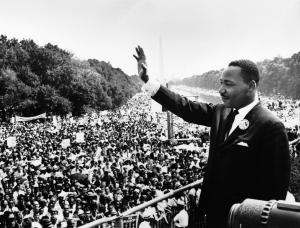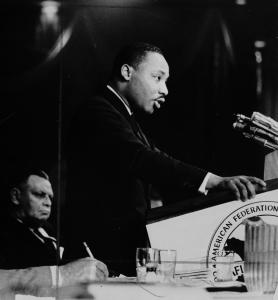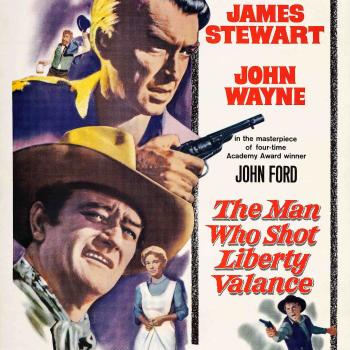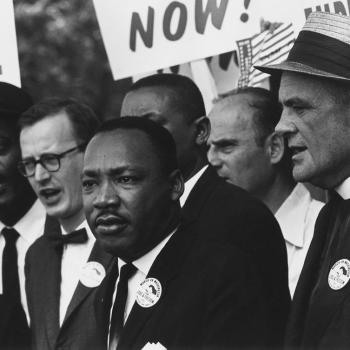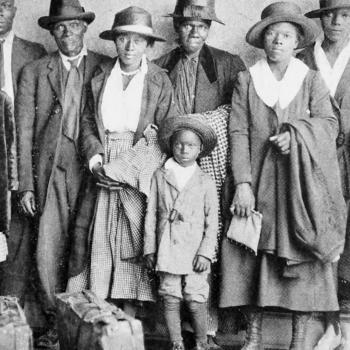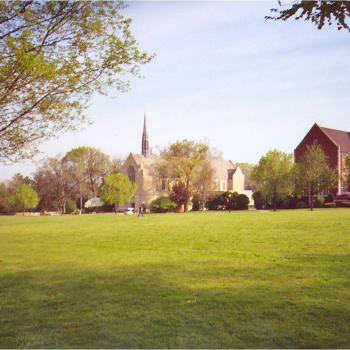A year ago, I spoke at Eastern Nazarene College to celebrate Martin Luther King’s legacy. As I prepared this talk, my thoughts on race began to solidify, particularly my understanding that capitalistic exploitation lies at the root of its historical construction. I figured I would share the first half of the talk with you to remember for MLK day/week. It’s a little lengthy so settle in if you’re down for it.
Especially over the last few years, people seem very eager to appropriate his legacy and message. You’ve probably heard people from all across the political spectrum quote King, especially his “I Have A Dream” speech. If there is one historical figure that everyone wants to be on their side, it’s Martin Luther King, Jr. If we heeded all of the people who claim to be guided by his mission and message, it would seem that his murder came out of nowhere. But it did not. Martin Luther King was tragically murdered not because he was too loving, but rather because he, especially as his ministry and activism developed, was a profound threat to a racist status quo. After a ministry that was almost exclusively focused on the South, King moved his work to the North and when he did that, he found that white supremacy was much deeper than he imagined. As we discuss King, I’m going to quote him liberally, so that we can get an idea of who Martin Luther King, Jr. really was: a warrior for justice and a wonderful example of Christlike love. To understand King’s legacy, however, we must first look at the problem that King saw. Then we’ll talk about his solution.
First, the problem. We cannot talk about King if we don’t talk about the evils that he resisted and the evils that we must also resist. If we pay attention to King’s actual words, the evils are threefold: poverty, racism and militarism. So what does King think about racism? Well here’s what he said:
It seems to be a fact of life that human beings cannot continue to do wrong without eventually reaching out for some rationalization to clothe their acts in the garments of righteousness. And so, with the growth of slavery, men had to convince themselves that a system which was so economically profitable was morally justifiable. The attempt to give moral sanction to a profitable system gave birth to the doctrine of white supremacy.
When King is talking about racism, this is what he’s talking about: white supremacy. A doctrine by which white people are declared to be superior and not just ideologically. It is a doctrine that lies at the very heart of our national history and institutions. It is the doctrine that justified the slaughter of indigenous peoples and the enslavement of Africans. It is the doctrine that justified the continuing racialization of Black people, Asian people. Hispanic people and Indigenous people as racially inferior and the doctrine that undergirds the practices that have led to the massive wealth gap that we witness, the anti-Black and anti-Asian violence that we have especially seen over the last few years…all of it. White supremacy is the term for it according to King. Not only that, but King also pointed to two very, very important elements of this doctrine: that it is, at its root, a doctrine of justification and that it is inextricably linked to economics. From the very beginning, “whiteness” didn’t really matter or mean anything until European powers traveled beyond their shores intending to conquer. When they came into contact with peoples who did not look like them or act like them, they, like many of us, were unable and unwilling to distinguish without hierarchy. When witnessing African and indigenous civilizations, Europeans did not see civilization. They saw savagery. That assumption was even written into our Declaration of Independence, which has the line: “He [the British king] has excited domestic insurrections amongst us and has endeavoured to bring on the inhabitants of our frontiers, the merciless Indian savages, whose known rule of warfare, is an undistinguished destruction of all ages, sexes and conditions.” Said another way, white settler-colonialists were upset that Native Americans would have the audacity to fight for their own land. Didn’t they know that God had promised this land to the white man?
Now there will be a tendency at this point. Hackles will begin to rise for some. Resistance will start to bubble up. If you’re feeling that, suppress it for the moment. For now, I’m just narrating history. I will leave much of the interpretation of it to King himself. For our purposes right now, it’s important to remember that from the beginning of this nation, racist narratives have undergirded our laws and our major institutions, whether it is the legal system that kept chattel slavery intact for almost two centuries, the Supreme Court led exclusively by elite white men for most of its history, or an economy built on human and sex trafficking, otherwise known as racial chattel slavery. The big issue, however, is that alongside these realities, America has told itself a lot of things about itself. These are some of the reasons why it is so hard for many to reckon with this history. We’re the land of the free, one might say. We’re the home of the brave, one might say. A land of liberty and justice, so we tell the world. Here’s what King had to say at the end of his life in an essay that was published posthumously:
Why is the issue of equality still so far from solution in America, a nation that professes itself to be democratic, inventive, hospitable to new ideas, rich, productive and awesomely powerful? The problem is so tenacious because, despite its virtues and attributes, America is deeply racist and its democracy is flawed both economically and socially.
This is Dr. King after the Civil Rights legislation. “America is deeply racist.” In his own words, he did not see the revolution that he wanted to see because the racism goes so deep.
It is notable that the gathering to form the constitution for the so-called “first democratic nation” was a gathering of white men. It is not an overstatement to say that that work was a work fundamentally interested in affirming and consolidating the power of white people. Most of those founders were well off. About 40% were or had been slaveowners and many of the others benefited from slavery, whether they were bankers, lawyers, shippers, or merchants. I want you to see, to hear how much of the Constitution was specifically intended to protect racialized chattel slavery. Keep in mind that when I’m referring to racialized chattel slavery, I am referring to a brutal system founded upon theft of human beings, sexual assault and exploitation, torture, and economic exploitation of a very specific, racialized population purely because of this made-up category called race.
At least seven sections of the Constitution protect and buttress the institution of slavery. Article 1, Section 2 counts an enslaved person as only three-fifths of a white person. Enslaved people could not vote, so they were stripped of any political power and on top of that, they were considered wealth of plantation owners. So you’ve got a full-throated affirmation of, literally, white supremacy, in that white people are a whole person and Black people are less than that. Added to that, you have a rather perverse political benefit for southern slaveholders: the more slaves you have, the richer you are. The more slaves there are in your state, with a legislative branch that depends on population, the more political power your state has. But Black people are, by law, restricted from taking part in that process.
Article 1, Sections 2 and 9 apportion taxes using the three-fifths formula. The more slaves, the more money. But the benefit is largely, if not entirely enjoyed by whites.
Article 1, Section 8 gives Congress authority to suppress slave insurrections. Or said another way, if you attempt to resist a fundamentally unjust and exploitative system, the US Army can crush you.
Article 1, Section 9 prevented abolishing the slave trade before 1808. But keep in mind: abolishing the trade did not abolish the practice.
Article 1, Sections 9 and 10 exempt slave-made goods from export duties. Benefits slaveholders/human traffickers.
Article 4, section 2 requires the return of fugitive slaves.
Article 4, section 4 stipulates that the federal government must help states put down domestic violence, in many ways a reiteration of the risk of slave uprisings.
These and other pieces of the text shaping the census created a legal foundation for a nation in which white power would dominate. If not for this system, Thomas Jefferson would not have become president. If not for this system, numerous actions during the lifetime of racialized chattel slavery wouldn’t have taken place. The foundation of the nation placed considerable political and economic power in the hands of human traffickers and they held it and used it until 1860.
The Fugitive Slave Law in 1850…only successful because of the three-fifths clause.
All of this is merely data to back up the claim that King, other civil rights leaders, and in fact, Black people throughout American history have made: that we were founded by racism and in some ways continue to live on racism. Even after slavery gives way to the Civil war, that was a war over a particular economic system, not a war over white supremacy. Those in power throughout the country perpetuated slavery by other names for the century after the Civil War, whether it was Jim Crow or racialized terror lynchings where primarily Black men would be killed by mobs of thousands by rope, by fire, and by bullets because of accusations largely of murder and rape or the practice of convict leasing.
But racism is actually just one of the systemic evils that he names. The second is poverty, economic exploitation. The problem with this one, according to King, is that because we’ve avoided dealing with it for so long, it appears to be an insurmountable obstacle. As King would say,
When millions of people have been cheated for centuries, restitution is a costly process. Inferior education, poor housing, unemployment, inadequate health care- each is a bitter component of the oppression that has been our heritage. Each will require billions of dollars to correct. Justice so long deferred has accumulated interest and its cost for this society will be substantial in financial as well as human terms. This fact has not been fully grasped, because most of the gains of the past decade were obtained at bargain prices. The desegregation of public facilities cost nothing; neither did the election and appointment of a few black public officials.
It was perhaps King’s commitment to the alleviation of poverty that got him killed. The night before his assassination, he was working with striking sanitation workers because it would expose the need for economic equality. King’s Poor People’s Campaign was meant to do precisely that work because after he moved his ministry from the South to the North, he was reminded that the fight against racism necessarily included a fight against poverty. He gave a speech to his staff in 1967, saying,
We are now making demands that will cost the nation something. You can’t talk about solving the economic problem of the Negro without talking about billions of dollars. You can’t talk about ending slums without first saying profit must be taken out of slums. You’re really tampering and getting on dangerous ground because you are messing with folk then. You are messing with captains of industry. Now this means that we are treading in difficult water because it really means that we are saying that something is wrong with capitalism.
At this point, King was clear: the exploitation of the poor was constant and evil and it wasn’t exclusively racial. Poor whites were victims of this system as well and in his love for humanity, King fought for them as well. But racism and capitalism were profoundly intertwined in King’s mind and they have been in history as well. If there is one thing that King was fervently in support of, it was redistribution of wealth because of the unjust patterns of poverty that he witnessed. In light of the redlined neighborhoods that he saw in his travels and the abject poverty that he saw his brothers and sisters living in, white, black, all races, he said these things. Hear it straight from him:
To the Negro American Labor Council: Call it democracy or call it democratic socialism, but there must be a better distribution of wealth within this country for all of God’s children.
To the SCLC Board on March 30, 1967: The evils of capitalism are as real as the evils of militarism and the evils of racism.
To the SCLC Staff in May of 1967, “We must recognize that we can’t solve our problem now until there is a radical redistribution of economic and political power. This means a revolution of values and other things. We must see now that the evils of racism, economic exploitation and militarism are all tied together. You can’t really get rid of one without getting rid of the others. The whole structure of American life must be changed. America is a hypocritical nation and we must put our own house in order.”
Are you hearing it? This is the mature Dr. King. The radical King. And by radical, I do not mean “extreme”. I mean it in the definition of the term: to the root. Dr. King was not fundamentally concerned with the symptoms; rather, he was concerned about the intertwining disease; the talons and tendrils of white supremacy, economic exploitation and war. And if we want to get practical as to what King thought would help to remedy poverty, in his last essay, he advocated for a guaranteed job for all people who want to work and are able to work and a guaranteed income for those unable to work since, of course, there are a wide number of people in this country in that category, whether they are too young, too old or physically disabled. Even then though, they need money to live.
So we’ve got two evils: racism and economic exploitation. The third to King was war…militarism. This one got him in even more trouble because of his speeches and activism against the Vietnam War. He marshaled his militant nonviolence toward peace, advocating for the United States to focus its resources on its domestic crises rather than hemorrhaging money abroad. On April 4, 1967, King gave his speech at Riverside Church condemning the war. A few years prior, he described it as a violation of the 1954 Geneva Accord (promising self determination) and emphasized that if America was going to use its power, it must be “harnessed to the service of peace and human beings, not an inhumane power [unleashed] against defenseless people” (Feb. 25, 1967, The Casualties of the war in vietnam). In short, this war was an example and a symptom of American colonialism worldwide and King said so loudly. You can probably guess that people didn’t like that at all. Immediately after King’s speech, “Beyond Vietnam in 1967,” the Washington Post and the New York Times published editorials excoriating the speech saying that it was counterproductive and that it limited King’s credibility. Even the NAACP critiqued King, saying that Vietnam and civil rights were two disconnected issues. Exactly a year after that speech, he was killed.
Why go through all of this? I want us to come away with two things. The first is that King was not universally loved and the only reason that he seems to be universally loved now is because people unfortunately haven’t really read him. King died with a public disapproval rating of 75%. 75%. Three out of four people in the country disapproved of Dr. Martin Luther King when he died. It was closer to 50 in 1963 but it rose over the course of his life because his ministry and activism got more focused and thus more sweeping. He became less concerned about merely legal segregation which, though it was bad, was a symptom of the broader disease of white supremacy, a society in which segregation was reasonable. A society in which people were perfectly comfortable seeing their fellow human beings suffer as long as they did not have to suffer themselves. As King began to turn the mirror on American society with no concern for it feeling good about itself, people started to get antsy and started to disapprove of him. Then after his death, those latter years are treated as though they are anomalous rather than the result of King’s own growth.
The second of these things is that the Rev. Dr. Martin Luther King, Jr. was not merely concerned with racial justice. Racial justice is a huge deal and we know it. We’ve seen it throughout our lifetimes. But it is not the only battle that is to be fought. If we are to speak of Dr. King’s legacy and if we are to seek to continue it (and that “if” is an open question, that’s a decision you will have to make for yourself), it must be in resistance to the three evils. Not one. Three. Racism, militarism AND economic exploitation.


